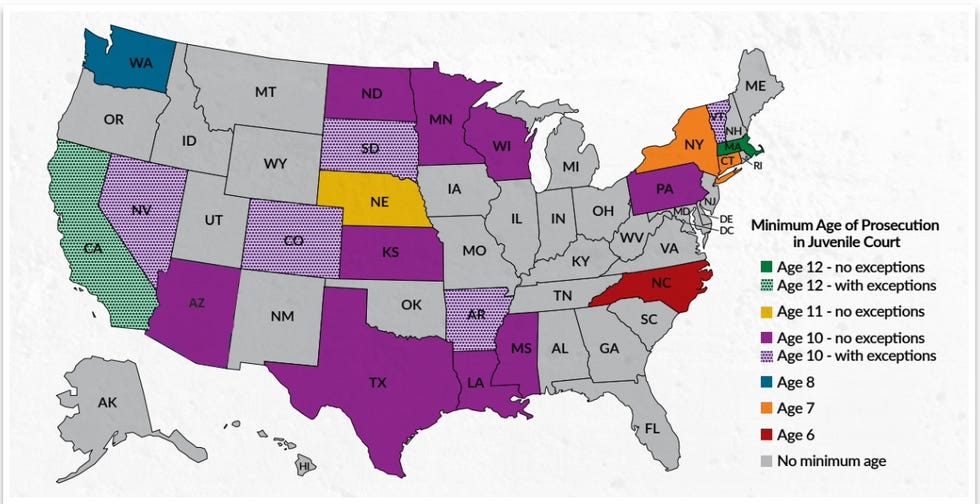Some In North Carolina Think Sending 6-Year-Olds To Court For Picking Tulips Might Be Bad
Definitely something to consider!
Last week, North Carolina state Rep. Marcia Morey filed a bill (HB-261) that, if passed, would change the minimum age a child can enter their juvenile justice system from six years old to 10. Because as things currently stand in the state, a first-grader can be charged with an actual crime for which they have to go to court, participate in their own defense, be found guilty or not guilty, and be sentenced by a judge. These sentences can range from "referral to social services or probation to community service or commitment to a a private or state facility."
From 2015-2018, 70 six-year-olds were prosecuted in this manner. Six-year-olds!
Perhaps, if you are a reasonable person, you are now thinking, "So like ... are we talking a Mary Bell kind of thing? Are the kids like evil sociopathic murderers going around strangling small children?" No, we are not. And also Mary Bell was 10 and 11 when she killed those kids, not six. Rather, we're talking about first-graders picking tulips at the bus stop being sent to court on charges of "injury to real property" and other "crimes" for which detention, a stern talking to, or a time-out is likely sufficient.
The 6-year-old accused of picking the tulip ended up before a judge because his mother couldn't make the intake meeting. Once the judge realized what was happening, he dismissed the case, said Boyer.
It's a common resolution with the youngest children, attorneys said, pointing out another reason to keep children out of the system.
"He gets served with papers. His mom gets served with papers," Boyer said. "It was just appalling."
Other cases have involved young children who have broken windows at a construction site with older friends and stood on a chair and thrown a pencil at a teacher, attorneys said. Another case involved sexual exploration with another child, attorneys said.
One of Mitchell's youngest clients was a 9-year-old with autism whose response to a teacher resulted in him being found guilty of assault on a government official.
Shockingly, experts on these matters do not think six-year-olds should be in the court system at all, and in fact recommend 14 as the most reasonable age to start charging children in juvenile court — as that is the age at which, barring some extreme cases, people start being able to form actual criminal intent .
Unfortunately, while North Carolina has the lowest possible age at which one can be sent into the juvenile court system, many states have no minimum at all. Though hopefully this means they are not regularly going around prosecuting six-year-olds for picking tulips and it just wouldn't even occur to them that this would be a thing.

Map of minimum age to enter the juvenile justice system
New York and Connecticut are no great shakes either, with seven being the minimum age in those states.
You may be thinking now, "Is this racist? It's probably racist, right?" And you would be correct.
Another criticism of the juvenile justice system is that it disproportionately affects young children of color.
"When a cop picks up a white boy, he takes him to his parents," said Mary Stansell, juvenile chief at the Wake County Public Defender's Office. "But if he is black, he takes him to the state."
From 2015 through 2018 nearly 7,300 complaints were filed against children age 6 to 11 years old, according to numbers from the state Juvenile Justice section.
Of those complaints, 47% were against Black children, 40% were against white children and 7% against Hispanic or Latino children.
In general, 22% of the state's population is Black, 70% is white and 10% is Hispanic.
Roughly 82% percent of the complaints were against boys.
It's actually surprising that it's not worse than that.
The issue here is not just that society likely does not need protection from rogue six-year-olds picking flowers, but also that this could screw up said rogue flower pickers for life. Being labeled as a "troublemaker" early on can do messed up things to your head and warp your self-perception for life. For years I talked about how I was a "bad kid" and then one day someone asked me what I actually did, and I said, very seriously, "Oh, I was always getting in trouble for talking or laughing during 'silent lunch' and would have to go eat my lunch on the stage with the other kids who got in trouble!" And as it was coming out of my mouth, I realized finally that I wasn't bad, forcing elementary school children to eat their lunches in silence, in the dark, was bad.
That's a funny story, sure, but we all saw in school how the kids who got labeled as "bad kids" or "troublemakers" by teachers early on often never found their ways out of that role. Imagine how a kid having to go to actual court and sit in front of a judge would screw with their little heads. It is absolutely astonishing that anyone would think this was not a completely batshit thing to do. Society doesn't need to be "protected" from these children, and it's only going to psychologically harm the children themselves, so it's hard to see what the benefit would be to anyone. Even for more serious infractions, therapy would obviously be more beneficial than anything the juvenile justice system might dole out.
While a similar bill Morely put forward in 2019 failed to pass, hopefully legislators won't be too afraid to look soft on tulip crime to pass this one.
Wonkette is independent and fully funded by readers like you. Click below to tip us!




@thegrandwazoo2:disqus: Ignore @villagodelendaest:disqus; you can stamen.
Hope to God you're not there now. I hate this whole idea and can't believe it's still a thing in this day and age. We're begging kids to be outside (instead of being forced as in my day!), and then prosecuting them for doing what comes naturally GRRRRR